- Home
- Peter Ackroyd
The house of Doctor Dee Page 9
The house of Doctor Dee Read online
Page 9
'Oh, do you mean your book of old fables which you enjoy by the fireside?'
'Not fables, madam. The acts of the ancient kings of England.'
'I put it away,' she replied. 'Away from the fumes of the meat you find so bad.'
She had a sharp tongue upon her still. 'Go to, gossip. Fetch me the book.' She did not budge from her seat. 'Have I not power to command in my own house?'
'As you will.'
'Well said. Then bring me my book.'
With a laugh she rose and went over to a chest, whereupon she opened it and with a flourish presented me with Gesta Regum Britanniae; then she sat down beside me on a close-stool to watch me read. But I was not to be granted peace. 'Oh,' she said after a few moments. 'A message came. Your father is still ill with fits of the ague.'
'It is an evil sickness,' I replied as I continued with my reading.
A few more moments passed. 'So tell me, husband. Shall we visit the maypole? It is good to walk after meat.'
'Enough!' I put down my book and, going into the passage, called for a chamber-pot to relieve myself. I retired into the little room next to the hall and, having pissed mightily, I intended to throw it forth at the window (for it had begun to rain) when I caught the savour of my urine in my nostrils; it had a high odour to it, like that of fresh cinnamon, and put me in mind at once of the wine I had taken the night before. But there was more virtue in it now, having been dissolved within me and then congealed again; it had become a humid exhalation from which the volatile substance had been removed and, if all moisture were finally to leave it, then at last it would become a stone. If it were to become a dry or powdery substance, in form a mineral, could it be used to fructify the land — as the urine of man is said to do — and in its sublime state generate a thousandfold? There was something here worthy of closer study, and so I took my pot up to my laboratory where I determined upon some further experiments of sublimation and fixation.
I am not some poor alchemist, new set up, with scarcely enough money to buy beechen coals for my furnace; over these years I have found or purchased all my instruments and substances, so that I have no need to rake some dunghill for a few dirty specimens. But neither have I anything to do with the cthonic magic of the past which secreted itself in caves and woods: those were times of witches and hags, dwarfs and satyrs, conjurors and changelings, invoking the incubus, the spoor, the hell-wain, Boneless and other such bugs of the night and the mist. Into what blind and gross errors in old time we were led, thinking every merry word a very witchcraft and every old wife's tale a truth, viz. that the touch of an ashen bough causes giddiness in a viper's head, and that a bat lightly struck with the leaf of an elm tree loses his remembrance. But these are trifling matters of which I do not complain. Indeed there was a certain truth to them if they had, as they say, been viewed in the light — light being the bright path of life, by which the virtues of the sun and stars are generated within the world.
But if I am no moth-eaten alchemist, neither am I some newfangled astronomer who feigns eccentrics and epicycles and suchlike in order to save the phenomena, when he knows full well that there are no such engines within the orbs. Each of them follows the newest way, which is not ever the nearest way: some going over the stile when the gate is open, and others keeping the beaten path when they may cross better by the fields. They are like eager wolves that bark at the moon when they cannot reach it — even though, if they did but know it, the very same moon, and stars, and all the firmament, lie within their own selves.
Shall we then look upon the heavens as a wolf, or an ox, or an ass does? No, it cannot be. Yet to find or receive some inkling, glimpse or beam of what are the radical truths, it is necessary to unite astronomy with astrology, yes, even with alchemy which is known as astronomia inferior; by so doing we may in the method of Pythagoras restore the ternary of these arts to unity or One. Such is the infinite desire of knowledge and, as I have proved for myself, such is the incredible power of man's search and capacity: it is the learning of that which lives for ever and not of that which passes through time. No doubt these studies are dispraised by those who understand them not, but there must come an age when all true lovers of wisdom turn their hands and bend their minds to these doctrines.
Here is the eternal connection. In our astronomy we view the seven planets in their eternal order, Jupiter, Saturn, Mars, Sol, Venus, Mercury and the moon, while in our experiments we proceed through the seven alchemical doors, calcination, fixation, solution, distillation, sublimation, separation and projection. Then in astrology we compound the two, by scrutinizing the secret influences of the planets and the stars while at the same time loosening the chains of each element in this elemental world. The stars do live and, through the spiritus mundi, influence us; there is sympathy or disharmony between all living things, and to gain mastery over this point is to exercise control over the entire world. There is nothing done in the lower world which is not controlled by the powers above, nothing moved or changed in the sublunary sphere except with the aid of the incorruptible heavens whose emblems and messengers are the planets and stars. Thus when the moon lies between the twenty-eighth degree of Taurus and the eleventh of Gemini, then is the time to search for the hidden seeds of life. I have demonstrated before this time that when Saturn and the moon are three score degrees of the zodiac apart, then it is good to gather those seeds and bury them deep within the warm earth. The natural beams of the lighted stars are to be found at work equally in both spheres, in things visible and invisible, at all times and in every horizon assigned. So may these beams be distilled and, like the morning dew, refresh and excite new life.
What is above also lies below; what is below is also above. And here we approach upon our knees another great secret: the sun, gold, and the heart of man are analogous. If I control the light and the heart's passions, then I can begin to discover or refine the material substance of gold. If I wish to make that metal, therefore, I must make my own self pure and become (as it were) an agent of the light which dwells in all things. Yet if I can create the most precious and sacred substance from the mere dross of the world, then in similar manner I must proclaim how within the mortal world of decay and within our own selves there is that which is constant, unchangeable and incorruptible.
I have done so many rare and precious experiments upon this truth that I cannot reckon up all of them now. So many strange speculations and incredible practices have been made manifest to me that to speak of the objects created from smoke or vapour, of the secret balances of sulphur and mercury, of the consummation of the chrysolite and beryl, would be a task fit only for the great Hermes Trismegistus himself. I will say only this. While mortal sense rules within us, so gross is our comprehension and dull our sight that it is necessary to curb our outward faculties and look towards the inward world; therewithall you will see yourself as a being made of light. The true man is astral man, containing within him not the star-demon (as some commentators say) but the material of divinity itself. If in the event you do not therefore make yourself equal to God, you cannot know God — like is intelligible only to like. Man was once, and will again, be God. And so I say once more: at death material and corruptible things will become invisible and, just as the dross of the world can in the chemical wedding be turned to gold, so can we return to light. Yet there is a greater mystery than all; for what if it were possible, before death ever came, to assume that light and mingle with the godhead? Why, then I might arise, climb, ascend and mount up to behold in the glass of Creation the form of forms, the exemplar number of all things numerable. Then I might foresee great particular events long before their coming, or view the passages of antiquity as if standing there in bodily shape from everlasting to everlasting. But more than this is there, and still more: why, I might use that light to quicken life itself within my own hands. I have beside me a glass vessel prepared and waiting for my little man, but of this no more can be said or written. Oh comfortable allurement, oh ravishing persuasion, to
deal with a science whose subject is so ancient, so pure, so excellent, so surmounting all creatures in their distinct parts, properties, natures and virtues, so implicate with order and absolute number!
Enough. I will use no tedious discourses or colour of rhetoric which, though they are deemed courtly by the lowly sort, are by no means necessary. The purest emerald shines brightest when it has no oil. It has grown twilight gloomy, and a few moments ago there was a clap of thunder with some lightning. I take up the pages which the canting beggar gave to me in the garden, but can see only a certain kind of curious writing in the English tongue. There are the words 'house' and 'father', all closely inscribed, but in the gathering darkness I can read nothing more. So I light my candle and watch its fire. As the darkness is lifted the wax is consumed: the substance does not die, but is transformed into flame. This is the final lesson. By means of that fire the material form of the candle before me rises into its spiritual being. It has become a light and a shining within this poor shambling room, my library.
THREE
I REMEMBER VERY little about my childhood. Sometimes it is hard to believe that I had one at all. Even if I was lying on my deathbed, I doubt that I would recall anything more distinctly; it would be as if I had come into being, and passed away, within one night. Yet often, when I close my eyes, I see certain streets or buildings which I must have visited once. Then again, in my dreams, I recognize the faces of people who are talking to me. Oh yes, I do remember something. I remember a violet colour. I remember the dust in the air, when a ray of sun came through the glass. 'I suppose,' I said, 'it must have been a window.' I had never talked about myself in this way before; it was as if the silence of the old house disturbed me, or provoked me, and I listened to my voice as it fell back into the darkness and was covered by it.
'I wonder why it is that you remember so little.' Daniel Moore and I were sitting in the ground-floor room, a few days after I had seen him in Charlotte Street; it was a fine summer evening, and the white walls seemed to be trembling in the light.
'I was probably a very dull child.'
'No. It's something more than that. You have such little curiosity about yourself. Or about your life. It's as if you were trying to ignore it.'
'You never mention such things, either.'
'Ah, but that's different. I am intensely curious about myself.' He looked away for a moment. 'I have almost an obsession about it, which is why I say nothing.'
Even as he spoke, I was thinking of that night when I saw him dressed in women's clothes. I could think of very little else as we talked together: it was as if someone were sitting with him, waiting for the opportunity to break into our conversation. There is a theory that the first human being was androgynous; so when I looked at Daniel, was I looking at some quest for the original state of the world? 'Let me get you a drink,' was all I said. I went out into the kitchen, and looked with something like pleasure at the pile of shining plates, the gleaming knives, and the shelves neatly stacked with food. In fact I could not quite remember placing everything so carefully, or polishing the crockery so brightly. But where were the wine and the whisky? The bottles had been moved, and it took me a moment to locate them in a cupboard beneath the sink. I was becoming absent-minded, and I pinched myself very hard before returning to Daniel. 'I wish I had your passion,' I said as I poured him his usual whisky.
'But you do. You have a passion for some more general past. You have a passion for your work.'
'And now you're going to tell me that I'm escaping from myself. Or that I'm avoiding the present.' He said nothing, but began examining his finely cut fingernails. 'Well, you would be right. I can't bear to look at myself. Or look into myself. I really don't believe that there's anything there, just a space out of which a few words emerge from time to time. And perhaps that's why I never see people properly. I have never really seen myself.'
'I think it's more interesting than that.' He got up from his chair and went over to the wall, tracing a narrow crack in it with his forefinger. 'I suspect that, without realizing it, you are reinventing yourself. It's as if you were trying to create some new family. Some new inheritance. And so you have forgotten your own past.'
I replied more angrily than I expected. 'But what about you? What do you remember?'
'Oh, I remember everything. I remember sitting up in my pram. I remember walking for the first time. I remember hiding under the dining-room table.' He noticed my look of surprise. 'It's not that unusual, you know.' He paused, and once again I could feel the presence of the woman he had become by putting on the red dress and the blonde wig. 'I suppose that nothing has been quite the same since.'
'So you miss being a child?'
'Doesn't everyone? Everyone except you?' He was drinking his whisky too quickly. 'Do you remember that bridge you saw across the Thames?'
'Of course.'
'I have a theory about that. I don't suppose you'd like to hear it?' His usual sceptical, even supercilious, manner had for the moment disappeared.
'Has it something to do with your Moravians, or whatever they were called?'
He pretended to ignore me. 'I think time may be a substance as real as fire or water. It can change shape. It can move to a different position. Do you see what I'm getting at?'
'I'm not sure.'
'That was your bridge. It was a part of time that had stopped.' He helped himself to another drink. 'Have you ever wondered why this area is so peculiar?'
'So you've noticed it, too.'
'It's because all the time has flowed here, into this house, and there is none left outside. You hold all the time in this place.' I was too surprised to say anything at all. 'And there is another theory, as well. That there are some dimensions in which time can travel backwards.'
'So I'm over before I've begun?'
'Isn't that the title of a song?'
'I don't remember.' We looked at each other expectantly, and I knew that I had to speak. 'I saw you the other night, Daniel.'
'I don't know what you mean.'
'I saw you in Charlotte Street.'
For a moment he held on to the edge of the chair very tightly. 'I could give you a very good theoretical explanation,' he said. 'There was a group of radicals who used to dress up as a protest against Old Corruption. It's a very ancient tradition.' I looked at him in astonishment, and then I began to laugh. 'I'm glad you can see the funny side,' he said. But he would not meet my gaze, and stared into his drink. 'Identity is a very strange thing, Matthew, and I can't begin to explain it. I told you I was intensely curious about myself, but I still haven't really found the clue to the mystery. In that respect, at least, we resemble each other. In earlier times no one gave such matters any thought, perhaps because they were part of an orderly universe —'
'Oh no. People have always wondered.'
'— but we are so puzzled. Wouldn't it be nice to return to some of the old theories? Soul and body? The four humours?'
'Oh, they never worked.'
'Of course they did. Everything works in its own period. Don't you think that people were cured by medieval doctors, soaking up black melancholy bile with white saltpetre? We could no more use their remedies than they could use ours, but they did work once. That's what you have to remember. Of course some people say that they might work again.' He was paying very little attention to me now, and seemed to be looking at something in the corner of the room. 'I suppose that's why so many are interested in magic. Sexual magic.'
'What?'
He seemed embarrassed, almost furtive, for a moment. 'Nothing. I was really thinking about my interest in — what you saw. I have never understood it properly. Sometimes I feel as if I'm excavating some lost city within myself. Do you know what I mean?' He got up from his chair, and started pacing around me. 'Why does everything have to be so secret, so deeply buried? It's like the sealed window upstairs.' He stopped. 'I'm sure there must be a sealed window here, aren't you?' He began walking around the room again, even more agitated
than before. 'We think that there must be some secret part of us which is made of gold. Which does not rust, and which is not corrupted. Do you know the quotation? And yet, if we found it, it would probably be fool's gold.' He went over to one of the old walls, and ran his delicate hand across its mottled stone texture. 'When I dress up, I must look a fool. And yet it is part of me. It gives me the strangest pleasure. It is like sex, without having sex. I don't understand it at all.'
I did not want to hear any more about his concealed life, and I tried to divert him. 'Is it true what you said about the radicals?'
He turned round and faced me. 'Oh yes. London breeds strange habits. In the eighteenth century a group of Marjories, as they called themselves, started fires at Tyburn and burned down the gallows. That's why the executions were switched to Newgate.' He smiled now, and went back to his chair. 'I'm afraid I'm much more docile.'
I sensed that he was still holding something back but, as I said, I did not want to get too close to the source of his obsession; it would have been too painful, too extreme. He sensed my nervousness, and waved his hand in the air as if he were dismissing the subject. 'Now,' he said, 'in real ghost stories they always explore the attic of the old house.'
'But there is no attic.'
'Oh. What about the basement?'
'We've done the basement already.'
'That's true. A room under the stairs?'
'Non-existent.'
'I think you will find at least a cupboard.'
We went into the hallway and there, as he predicted, was some hollow panelling just beneath the staircase; I had not noticed a small catch on the side, but Daniel knelt down and unfastened it at once. It was almost as if he had not needed to look for it. 'How did you know it was there?' I asked him.
'There is always a cupboard under the stairs. Haven't you read Lady Cynthia Asquith?' But at that moment I realized he knew this house very well. 'Ah,' he said, more quickly now. 'Pipes. I wonder if you get your water from the old Fleet River. That would account for your behaviour.'

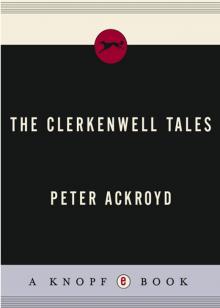 The Clerkenwell Tales
The Clerkenwell Tales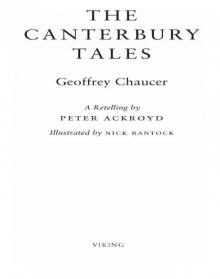 The Canterbury Tales
The Canterbury Tales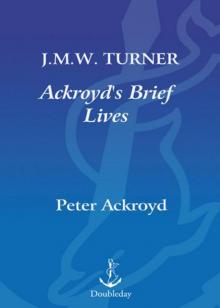 J. M. W. Turner
J. M. W. Turner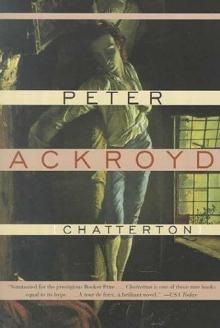 Chatterton
Chatterton The Canterbury Tales – A Retelling
The Canterbury Tales – A Retelling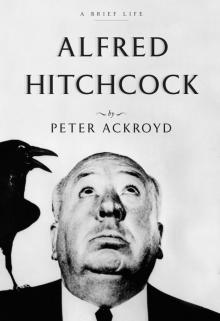 Alfred Hitchcock
Alfred Hitchcock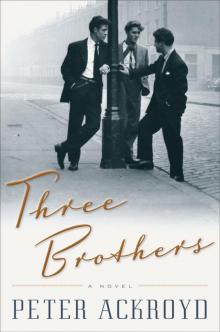 Three Brothers
Three Brothers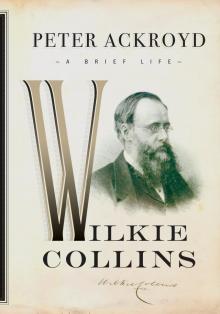 Wilkie Collins
Wilkie Collins Venice
Venice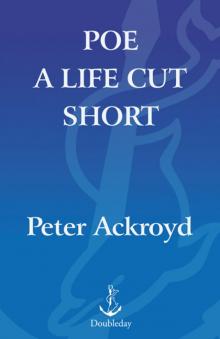 Poe
Poe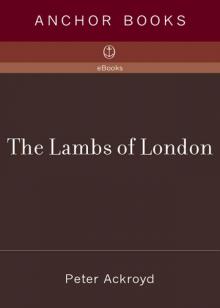 The Lambs of London
The Lambs of London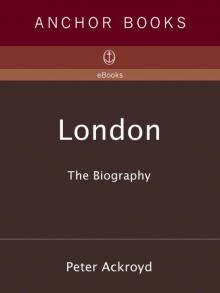 London
London Queer City
Queer City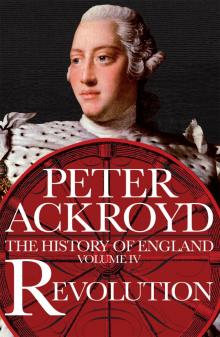 Revolution, a History of England, Volume 4
Revolution, a History of England, Volume 4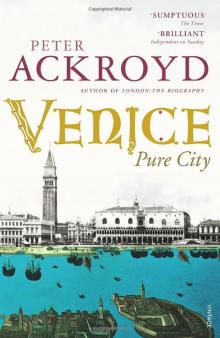 Venice: Pure City
Venice: Pure City Foundation
Foundation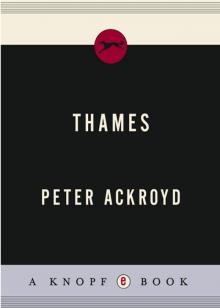 Thames
Thames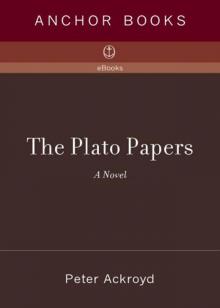 The Plato Papers
The Plato Papers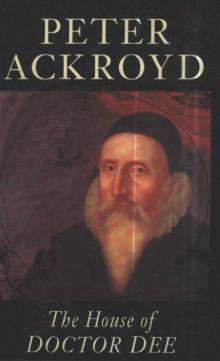 The house of Doctor Dee
The house of Doctor Dee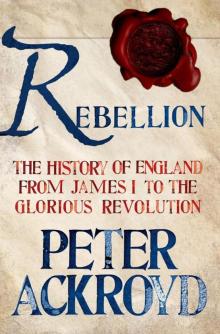 Rebellion: The History of England from James I to the Glorious Revolution
Rebellion: The History of England from James I to the Glorious Revolution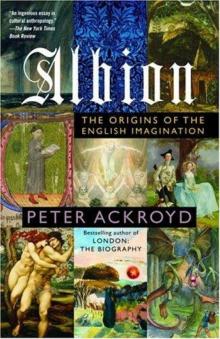 Albion: The Origins of the English Imagination
Albion: The Origins of the English Imagination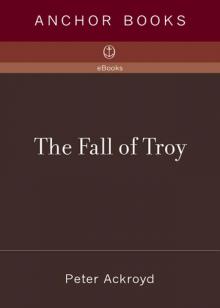 The Fall of Troy
The Fall of Troy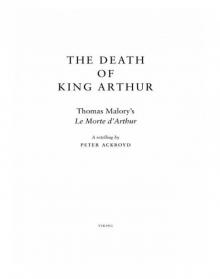 The Death of King Arthur
The Death of King Arthur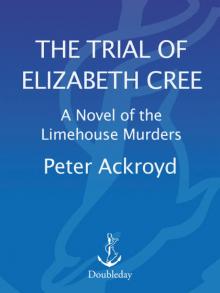 The Trial of Elizabeth Cree
The Trial of Elizabeth Cree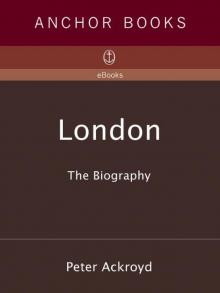 London: The Biography
London: The Biography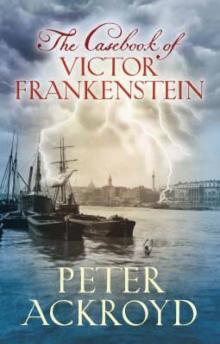 The Casebook of Victor Frankenstein
The Casebook of Victor Frankenstein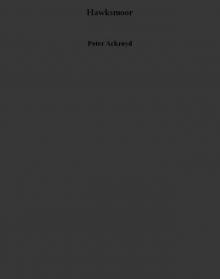 Hawksmoor
Hawksmoor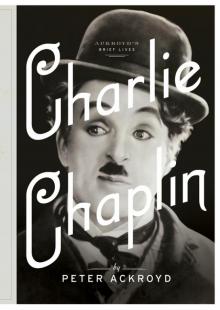 Charlie Chaplin
Charlie Chaplin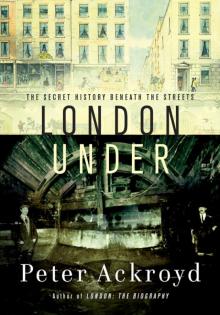 London Under
London Under